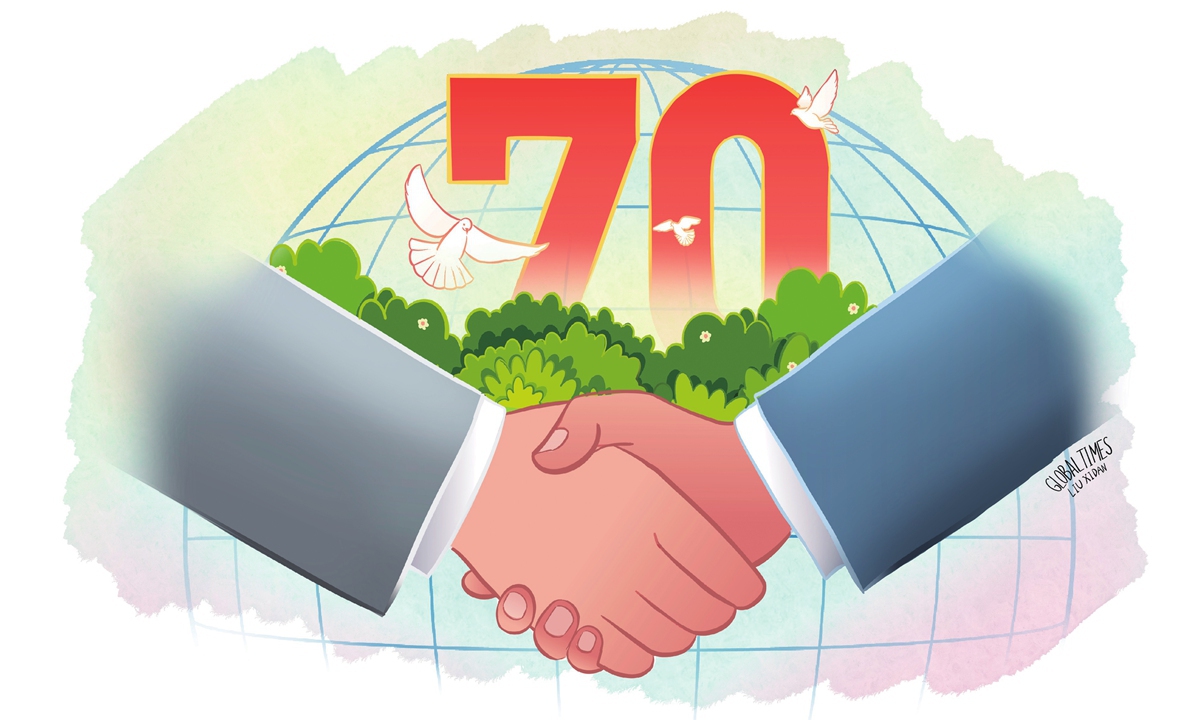
Illustration: Liu Xidan/GT
In 2025, the world will mark the 70th anniversary of the Bandung Conference. The meeting, held in Indonesia from April 18 to 24, 1955, brought together 29 Asian and African countries. Through consensus and mutual respect, they issued a final communiqué that gave birth to what became known as the Bandung Spirit - anchored in solidarity, friendship and cooperation. Today, multilateralism is under strain and the global system is at risk of drifting apart. Looking back and commemorating the Bandung Spirit is not only an inheritance of historical experience, but also a matter of practical choices.
Currently, the logic of international cooperation - based on openness, consultation and mutual benefit - is being challenged by unilateralism and protectionism. Institutional fragmentation and organizational hollowing have intensified, and global cooperation frameworks are increasingly marked by exclusivity and instrumentalization. Against this backdrop, the central challenge for global governance is how to rebuild international consensus and restore institutional credibility. The Bandung Spirit - with its emphasis on respecting diversity, inclusive dialogue and consensus-driven cooperation - offers a critical normative foundation for moving forward.
One of the milestones of the Bandung Conference of 1955 was that it created political space beyond great-power dominance and ideological blocs. Despite wide differences in political systems and development levels, the 29 Asian and African countries reached an agreement on the Ten Principles of Bandung. The Bandung Spirit was not a passive extension of the then-existing international order, but rather an early search for fairness and coexistence among diverse systems. It departed from Western-led institutional convergence and Cold War-era ideological divisions, articulating a Southern vision of global equity. It was not a replacement for existing norms, but a corrective. Not a rejection of difference, but an embrace of it.
Over the following decades, the Bandung Spirit has been woven into multilateral groupings such as the Non-Aligned Movement, BRICS and ASEAN. The growth of South-South cooperation, the rise of regional organizations and the increasing formalization of development discourse all reflect the Bandung Spirit's steady transformation into institutional language. The Bandung Spirit has become a realistic way for participation in global governance by the Global South.
Crucially, the Bandung Spirit was never meant to be confined to the Global South. It not only empowered Asian and African nations to stand united but also provided practical guidance for promoting more balanced North-South cooperation. 70 years later, as global rules are facing increasing imbalance and development anxieties are deepening, the search for a renewed development consensus has become not just a core demand of the Global South but a prerequisite for preventing deeper fractures in global governance.
In the current context, the Bandung Spirit offers a valuable point of departure. Re-centering the right to development and establishing development as a global priority are essential steps toward rebuilding the foundations of international cooperation. Principles such as equality, mutual benefit and collective consultation remain essential for global cooperation.
Commemorating the Bandung Spirit's legacy should go beyond symbolic ritual; it should lead to the revitalization of the global development agenda. Countries can utilize relevant policy forums and regional dialogue platforms to engage in substantive discussions on topics such as institutional equity, development finance and trade facilitation, helping to build partnerships that move beyond rigid North-South divides. Such cooperation will be a key support in preventing fragmentation in cooperation between countries and maintaining the coherence of the system.
Some 70 years ago, the Bandung Spirit provided a historical answer to the coexistence of differences among nations. Today, it offers a compass for addressing unilateral coercion, systemic fragmentation and global imbalances.
Shao Zhicheng is a PhD candidate at the Institute of Area Studies of Peking University (PKU). Zhai Kun is a professor at the School of International Studies of PKU. opinion@globaltimes.com.cn




